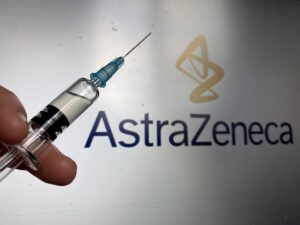Research about side effects of the AstraZeneca vaccine revealed some worrisome facts. An article that appeared in the German “Frankfurter Allgemeine Zeitung” explained that people should not worry about the vaccine.
The heading of the article was:” People no longer have to be afraid of the AstraZeneca-Vaccine.” But subsequently it describes how vaccinating with the AstraZeneca vaccine against Covid-19 developed blood clots in some people. Researchers at the University of Greifswald examined 7 cases where following the vaccine blood clots developed. Dr. Andreas Greinacher is Head of the department of Transfusion Medicine in Greifswald, Germany. He said that blood clots are extremely rare following vaccinations. The 7 people who did form clots in sinuses (big vein structures) of the brain had all antibodies against platelets. Normally platelets help with hemostasis for wounds, but when specific antibodies bind to platelets, they can cause blood clots.
Research about side effects of the AstraZeneca vaccine identified blood clots as a problem
The Greifswald medical team said that they know how to treat this blood clot condition when it occurs. They are using blood clot dissolving medication like heparin and warfarin to dissolve the clots. But if this treatment is not instituted right away, the patient could get a stroke or pulmonary emboli, which is a life-threatening condition. Normal minor side effects of the vaccine occur on the first and second day after the vaccination. If blood clots appear in brain veins, symptoms of severe headaches develop on day 4 or 5 following the vaccination. Other patients might develop a painful leg due to a blood clot in the leg veins. If this should happen, the patient must present immediately at the emergency department of a hospital. Physicians will start anticoagulation therapy right away. The 7 patients who developed blood clots did so between day 5 and 14 following the AstraZeneca vaccination.
European decision to reinstate the AstraZeneca vaccine
The European Medical Agency stated that the benefits would outweigh the risks of the AstraZeneca vaccine. They recommended reinstatement of vaccinations with the vaccine. However, there remain problems with the vaccine. First, the effectiveness of the vaccine was initially determined to be 79%, but retesting showed it is only 76%. Next the Paul-Ehrlich-Institut that monitors complications of medical procedures in all of Germany determined 31 cases of blood clots. 9 patients died from them.
Interestingly, the EMA has reversed their opinion about the AstraZeneca vaccine on April 6, 2021 as can be seen from this press statement. Now they are saying that there is a clear association between the vaccine and rare blood clots in the brain.
In the US the CDC and FDA have not approved the AstraZeneca vaccine. The CDC also said that the Johnson-Johnson’s vaccine should be put on hold until a re-examination of the blood clot issue is clarified.
Discussion
The Pfizer and Moderna vaccines are pure RNA vaccines that are known to have very few complication rates. Researchers stated that only very few people develop clots in their brain or leg veins. They also stated that the majority of people benefit from the AstraZeneca vaccine. This is a simplification. There are other vaccines that doctors can use as alternatives that do not produce clots. It would be better to ask why there is clot formation with the AstraZeneca Vaccine!
The AstraZeneca vaccine contains a DNA adenovirus
The AstraZeneca vaccine contains remnants of a DNA virus, namely an adenovirus. Researchers added the gene for the coronavirus spike protein to the DNA adenovirus.
The DNA shell from the adenovirus helps to protect the vaccine at fridge temperatures, which increases the shelf life of the vaccine. But as with other DNA vaccines there are more complications possible. Researchers reviewed this question already 10 years ago.
In the end we are still faced with RNA vaccines against Coved-19 that work, versus a DNA vaccine that has possible complications with blood clots. I for one would not accept anything else but an RNA vaccine that does not have the clot formation side effect. I feel that the authorities should stop the AstraZeneca vaccine for now. The researchers should carry out further studies to see whether improvements can make the vaccine safer.
Conclusion
The AstraZeneca vaccine contains a deactivated DNA adenovirus. Researchers added the gene for the coronavirus spike protein to the adenovirus. This is a completely different approach from the RNA vaccines that do not have these side effects. The fact that some patients developed blood clots is likely explainable on the grounds that they received a DNA vaccine. In my opinion the authorities released the AstraZeneca vaccine prematurely. They should put a hold on this vaccine until scientists can develop improvements to the vaccine. In the meantime, people should receive the safer RNA vaccines.
To continue vaccinating with AstraZeneca vaccine is unacceptable
I disagree that governments allow a vaccine that has serious complication rates for which doctors offer anticoagulation therapy. It is only a matter of time that a few deaths occur, because the blood clots escaped diagnosis. The company has now renamed the vaccine as Vaxzevria. This seems to be a move of AstraZeneca to move away from the complications of the AstraZeneca vaccine. This does nothing to help solve the problem with the blood clots that don’t only occur “in a few cases”. We are dealing with a serious side effect, and you should ask yourself the question, whether it is worth the risk.






